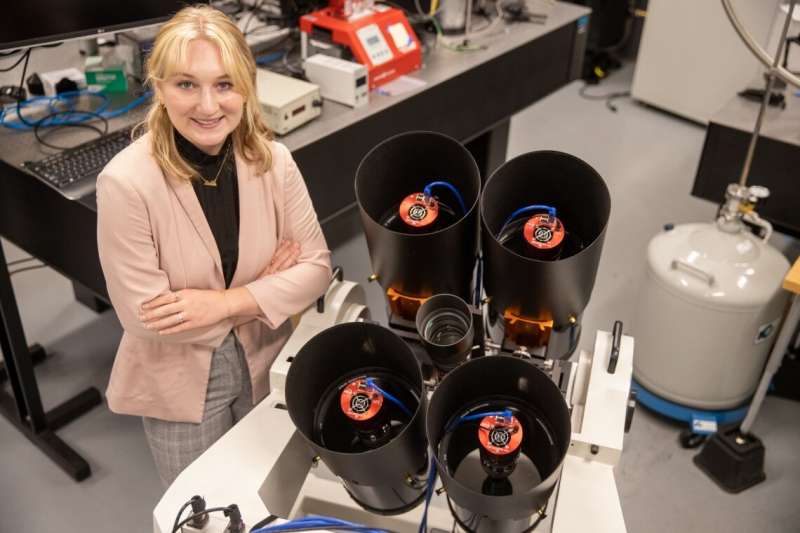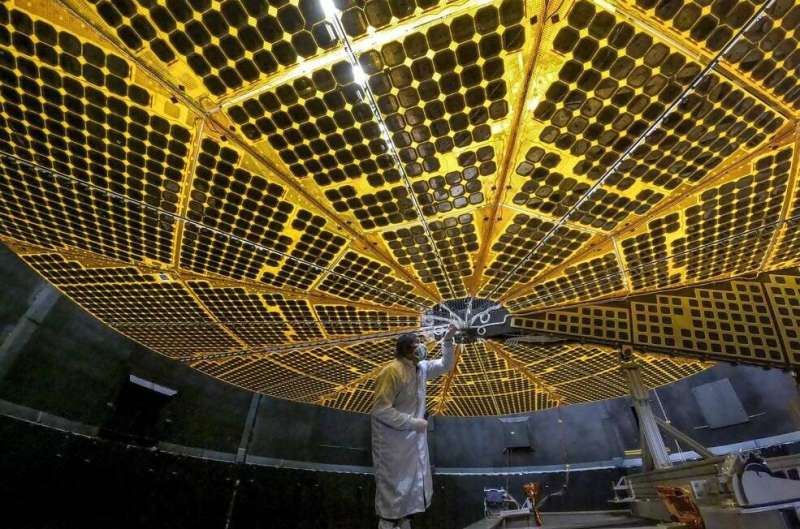
Copernical Team
First global map of cargo ship pollution reveals effects of fuel regulations
 A new study in Science Advances led by UMBC's Tianle Yuan used satellite data from 2003 - 2020 to determine the effect of fuel regulations on pollution from cargo ships. The research team's data revealed significant changes in sulfur pollution after regulations went into effect in 2015 and 2020. Their extensive data set can also contribute to answering a bigger question: How do pollutants and ot
A new study in Science Advances led by UMBC's Tianle Yuan used satellite data from 2003 - 2020 to determine the effect of fuel regulations on pollution from cargo ships. The research team's data revealed significant changes in sulfur pollution after regulations went into effect in 2015 and 2020. Their extensive data set can also contribute to answering a bigger question: How do pollutants and ot International Space Agency Teamwork puts the Whole World in our Hands
 NASA data scientist Dr. Manil Maskey has a calm demeanor and a ready smile. He's also a trailblazer. With peers from around the world, he has created an unprecedented tool to bring our planet down to Earth.
The Earth Observing Dashboard is a user-friendly interactive computer interface for exploring the planet and tracking its changes over time. This knowledge can help us understand our ow
NASA data scientist Dr. Manil Maskey has a calm demeanor and a ready smile. He's also a trailblazer. With peers from around the world, he has created an unprecedented tool to bring our planet down to Earth.
The Earth Observing Dashboard is a user-friendly interactive computer interface for exploring the planet and tracking its changes over time. This knowledge can help us understand our ow Tonga eruption blasted unprecedented amount of water into stratosphere
 When the Hunga Tonga-Hunga Ha'apai volcano erupted on Jan. 15, it sent a tsunami racing around the world and set off a sonic boom that circled the globe twice. The underwater eruption in the South Pacific Ocean also blasted an enormous plume of water vapor into Earth's stratosphere - enough to fill more than 58,000 Olympic-size swimming pools. The sheer amount of water vapor could be enough to t
When the Hunga Tonga-Hunga Ha'apai volcano erupted on Jan. 15, it sent a tsunami racing around the world and set off a sonic boom that circled the globe twice. The underwater eruption in the South Pacific Ocean also blasted an enormous plume of water vapor into Earth's stratosphere - enough to fill more than 58,000 Olympic-size swimming pools. The sheer amount of water vapor could be enough to t ASTRA announces major new equity facility
 Astra Space, Inc. (NASDAQ: ASTR) has entered into a common stock purchase agreement with B. Riley Principal Capital II, LLC ("B. Riley Principal Capital II"). The agreement governs a Committed Equity Facility that provides Astra the right, in its discretion and without obligation, to sell and issue up to $100 million of its Class A common stock over the course of 24 months to B. Riley Principal
Astra Space, Inc. (NASDAQ: ASTR) has entered into a common stock purchase agreement with B. Riley Principal Capital II, LLC ("B. Riley Principal Capital II"). The agreement governs a Committed Equity Facility that provides Astra the right, in its discretion and without obligation, to sell and issue up to $100 million of its Class A common stock over the course of 24 months to B. Riley Principal Slingshot Aerospace acquires Numerica's space division and UK-Based Seradata
 Slingshot Aerospace, Inc., a company building space simulation and analytics products to accelerate space sustainability, has announced that the company has acquired Numerica's Space Domain Awareness (SDA) division and UK-based Seradata.
Numerica's SDA division includes the world's first and only commercial low Earth orbit (LEO) to geosynchronous orbit (GEO) daytime and nighttime optical s
Slingshot Aerospace, Inc., a company building space simulation and analytics products to accelerate space sustainability, has announced that the company has acquired Numerica's Space Domain Awareness (SDA) division and UK-based Seradata.
Numerica's SDA division includes the world's first and only commercial low Earth orbit (LEO) to geosynchronous orbit (GEO) daytime and nighttime optical s SpaceX debris discovered in Australian sheep paddock
 A charred chunk of space junk found jutting from a paddock by an Australian sheep farmer was confirmed to be part of one of Elon Musk's SpaceX missions by authorities Thursday.
The ethereal-looking debris, believed to have plummeted to Earth on July 9, was found last week in Dalgety - a remote area near Australia's Snowy Mountains, about five hours' drive southwest of Sydney.
"It was ki
A charred chunk of space junk found jutting from a paddock by an Australian sheep farmer was confirmed to be part of one of Elon Musk's SpaceX missions by authorities Thursday.
The ethereal-looking debris, believed to have plummeted to Earth on July 9, was found last week in Dalgety - a remote area near Australia's Snowy Mountains, about five hours' drive southwest of Sydney.
"It was ki As reflective satellites fill the skies, UA students helping astronomers adapt
 As satellites crawl across the sky, they reflect light from the sun back down to Earth, especially during the first few hours after sunset and the first few hours before sunrise. As more companies launch networks of satellites into low-Earth orbit, a clear view of the night sky is becoming rarer. Astronomers, in particular, are trying to find ways to adapt.
With that in mind, a team of Uni
As satellites crawl across the sky, they reflect light from the sun back down to Earth, especially during the first few hours after sunset and the first few hours before sunrise. As more companies launch networks of satellites into low-Earth orbit, a clear view of the night sky is becoming rarer. Astronomers, in particular, are trying to find ways to adapt.
With that in mind, a team of Uni ULA launches missile warning satellite for US Space Force
 United Launch Alliance launched a missile warning satellite for the U.S. Space Force on Thursday morning. ULA launched SBIRS GEO-6, into orbit on its Atlas V rocket on time at 6:29am. The SBIRS GEO-6 is an enhanced satellite built by Lockheed Martin that uses the LM 2100 Combat Bus to provide "even greater resiliency and cyber-hardening against growing threats"
United Launch Alliance launched a missile warning satellite for the U.S. Space Force on Thursday morning. ULA launched SBIRS GEO-6, into orbit on its Atlas V rocket on time at 6:29am. The SBIRS GEO-6 is an enhanced satellite built by Lockheed Martin that uses the LM 2100 Combat Bus to provide "even greater resiliency and cyber-hardening against growing threats" As reflective satellites fill the skies, students are making sure astronomers can adapt

As satellites crawl across the sky, they reflect light from the sun back down to Earth, especially during the first few hours after sunset and the first few hours before sunrise. As more companies launch networks of satellites into low-Earth orbit, a clear view of the night sky is becoming rarer. Astronomers, in particular, are trying to find ways to adapt.
Team troubleshoots asteroid-bound Lucy spacecraft across millions of miles

Following the successful launch of NASA's Lucy spacecraft on Oct. 16, 2021, a group of engineers huddled around a long conference table in Titusville, Florida. Lucy was mere hours into its 12-year flight, but an unexpected challenge had surfaced for the first-ever Trojan asteroids mission.
Data indicated that one of Lucy's solar arrays powering the spacecraft's systems—designed to unfurl like a hand fan—hadn't fully opened and latched, and the team was figuring out what to do next.
Teams from NASA and Lucy mission partners quickly came together to troubleshoot. On the phone were team members at Lockheed Martin's Mission Support Area outside of Denver, who were in direct contact with the spacecraft.
